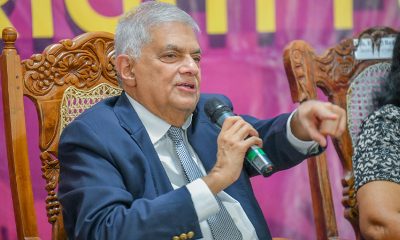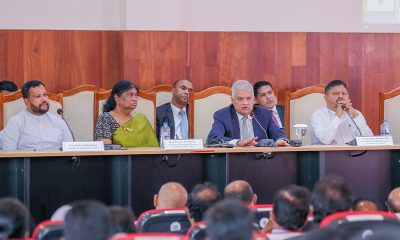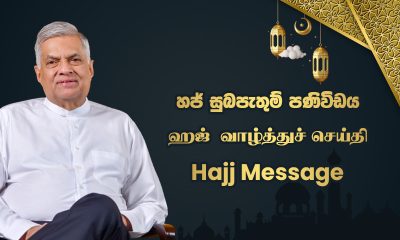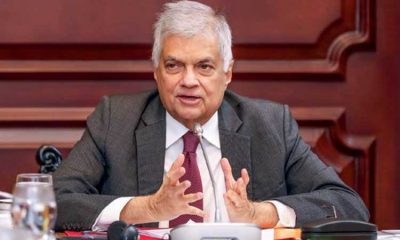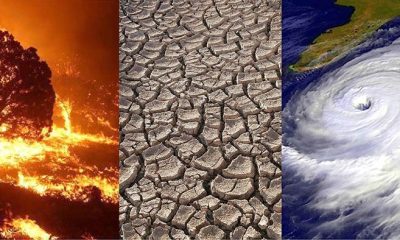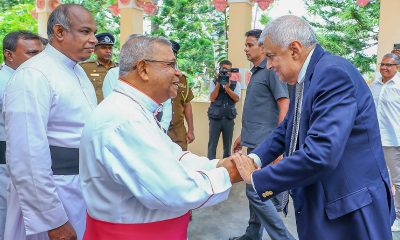News
Prez discusses global situation with focus on Ukraine war, etc.

President Ranil Wickremesinghe told the Indian Ocean Security Conference in Colombo that the sanctions imposed on Russia over the war in Ukraine had not caused the collapse of the Russian economy, which had just shifted eastwards.
The following is the text of the statement issued at the conference (Phase II) organised by the Pathfinder Foundation:
It gives me great pleasure to be here with you and the Pathfinder Foundation in addressing one of the key issues for us in Sri Lanka, for us in the region and for all of us in the world.
I must also commend Milinda Morogoda for having organised this session and for the continuing interest that has been shown in security in this region.
The Indian Ocean, let’s take it on its own, not as a part of BRI or part of the Indo-Pacific. The Indian Ocean has now ceased to be in the backwaters and we have become one of the strategic geopolitical regions in the world.
It has happened in the last five, six years. Events have helped us more than any other issue.So how does Asia fit into this context? Asia after all has its own identity, an identity older than that of Europe.
The first set of geopolitics was played either in the Mediterranean or in the Indian Ocean.The Indian Ocean geopolitics have gone on and it has also changed the politics of the world.Britain’s second empire and its rise to pre-eminence was due to India. Without India, Britain was nothing. That’s what Churchill realized.
So he opposed the independence being granted to the Indian Empire, but that was too late. By that time the world opinion had turned in favour of India and more than that, two and a half million Indians had fought in World War II and they were returned. That’s something they could not deal with. So that’s one. That certainly had an impact. India has always influenced the outcome of the Indian Ocean geopolitics to a large extent.
In the Muslim kingdoms, the Arab kingdoms were another, and for some time Indonesia and that area from the time of Srivijaya onwards. So this is basically Asia. Of course, colonial rule meant that we were shoved into the backwaters, but nevertheless, we were one of the most important regions in World War II.
And after independence, we started reasserting identity. Firstly, even before independence, Prime Minister Nehru summoned the Asian Relations Conference. This was followed by Prime Minister John Kotelawala, who summoned the Colombo Powers Conference, which in turn summoned the Bandung Conference. Bandung is the key watermark.
That is where the Asian identity was established. And we carried that forward. Thereafter, Prime Minister Nehru, with President Tito and President Nasser, started the Non-Aligned Movement. You had to include Indonesia, who was responsible for summoning the second Bandung Conference, the Asia-African Conference and also Sri Lanka, which got involved. So, India, Indonesia, Sri Lanka, has been involved throughout. Pakistan and Myanmar at different stages dropped out.
Now, what has happened in the last five years? We have come to the forefront for different reasons. One is the continuing, the build-up of tensions over Taiwan and in East Asia, which has resulted in China shifting its emphasis to the Indian Ocean. And the Silk Route, the BRI, has played a prominent role. The only question that has come is with the debt crisis of how the debt is to be handled by China. So that’s one issue that’s come up.
But during the process, one thing has happened. The Ukraine war, the sanctions imposed by the West did not result in the collapse of the Russian economy. It just shifted eastward. If you look at the amount of oil that is being refined in the Gulf refineries, it is far more than what is found in the Middle East, with the Russian and the Iranian oil. No one knows, we don’t know what we are buying. There’s a certificate.
But the whole of the Russian economy shifted here, into this region, towards Singapore and Hong Kong. But this became the main region, Dubai. So Russia has not collapsed, but the Russian economy, instead of looking westward, has come eastwards. And the money is here. So that became one presence.
Secondly Iran, Iran and Saudi Arabia have made up due to the Chinese intervention. So that’s the second power block that’s coming up. The Arab nations and the Sunnis and the Shias, both are coming together. They have their differences. But nevertheless, they are talking to each other. And some relationships have come about. But it also means, in the medium term, the rise of Iran. After all, the road to Central Asia lies through Iran. And India is helping Iran also in developing the second pole. So you’ve got a second group there.
Third one is India. India itself has become one of the largest economies and the Indian market will keep expanding till the late 21st century. So look at the potential for India, which everyone has recognized. And next is Indonesia and finally, South Africa. So you can see how the new power balances have come.
First was the issue of The US-Chinese rivalry, it brought China in here. Secondly, is the presence of Russia, rise of Iran, even Turkey showing interest, and a large presence of China as it happened there and then the rise of the Asian powers.
But it goes beyond that. For instance, you have the Shanghai cooperation countries bordering the Indian Ocean. Another aspect is the BRICS. The majority of the BRICS are in this region. These are the ones who are challenging the supremacy of the dollar. You take India you take South Africa and Saudi Arabia. Take Iran, even Egypt. All those countries are around the Indian Ocean.
In a sense, it’s building up on one of the resolutions of the Bandung Conference on economics. So the centre has come back here, because somehow other Indian Ocean nations want to take the lead again. And that’s happening.
Then, within it, what are we committed to? Sri Lanka is committed to the strategic position to ensure there is no big power rivalry and the freedom of navigation.
The freedom of navigation has led us now to take part in the operations, for a prosperity guardian in the Red Sea. Because as you see now as the rates go up, the Suez Canal is important for us. During the Six-Day War, when the canal was closed, for ten years, the Colombo port suffered. So we have to ensure that there is, as far as we are concerned, freedom of navigation. The main issues have been the Somali pirates, and now the Houthis. Houthis themselves are a terrorist organization, because we have recognized the Yemen government. So this is one part.
The other issue which is now coming up is the undersea domain, as far as security is concerned. How do you deal with that? So we feel now that the Indian Ocean is the future.
Then what is our relationship? How do we fit into the Indo-Pacific? That’s something that has to be worked out. Because basically, as Bernard Gunatelaka said, it’s of recent origin after World War II. You had the San Francisco system to maintain American dominance in the area and the Shanghai communiqué which brought China and the US together.
So with these two, we saw the emergence of Asia-Pacific when relations were good. Now the relations have turned sour.
So are we to be the battleground in the Indian Ocean?
Secondly, to me, it was a lackadaisical approach of bringing the Indian Ocean in. All of a sudden, decided that the Indo-Pacific will stop at the western boundary of India. Now that is not our ocean. That’s not something that we could accept. For us, the ocean went all the way up to the African coast.
Now the Chinese went one step further. They didn’t stop at the African coast. They thought of putting a rail line, which would take them to the Atlantic coast. On one hand, you are drawing the line at the Indian coast. The other one is taking it all the way up to the Atlantic coast. So those are the differences that have come up. So this meant that we had to see how it’s being developed. It’s only now. And that raises one of the issues. Whether this is really an extension of the manifest destiny?
It brought them into Hawaii, to the Philippines, into Asia Pacific. Is it manifest destiny here? Because then everyone else here has a manifest destiny. India has a manifest destiny. Indonesia thinks of a manifest destiny. So we’ll have a mix of manifest destinies in the Indian Ocean.
So I think we have to sit down and discuss it. And finally, of course, came the fact that Prime Minister Modi and others extended the Indian Ocean all the way up to the African coast.
And secondly, has come the ASEAN view of the Indo-Pacific, where you see as two different entities that are connected. I think that’s the best way that we could go.
But there are also the developments that are taking place in the Indian Ocean. Now while we are talking of this, there are new concepts that are coming in. We have to understand. Firstly, China has already got access to the Indian Ocean through Pakistan, the Friendship Highway. They will come into the Bay of Bengal through Myanmar, another port.
They get access from the interior of China. So that alone, then on the other hand, the agreements between India and Sri Lanka on connectivity, on developing the Trincomalee Harbour, also makes a change there.
Then on the other hand other new roles as I said, one that will go into, one that will take us into Central Asia. Secondly, the one is again what India, the Mumbai, UAE, Israel, Europe connection. That won’t take place immediately. But it is going to, it will take place maybe about another 10 years, 15 years. But it will most probably come through.
Once the Indian economy, if it hits half of what the Chinese economy has got to, you won’t be able to send the goods across. The Suez Canal will not be sufficient. We have to find other ways of approaching destinations.
So in this background, there’s one more issue that has come up now, which is really Gaza. What’s happening there? The Hamas attack on Israel, we have all condemned. But the war in Gaza has created issues. And that’s again, we’ll have the sentiment is not with the U.S. and may not be for some time, maybe five years, six years, longer.
That’s also going to affect diplomacy, whatever the governments want to do. Gaza has become another issue, and its important issue here, because remember, from the Middle East all the way to Indonesia is the arc of Islam. So how are you going to manage here?
This will most probably, will guide the developments in the Indian Ocean in the next few years, the coming decade.
But first is to accept the Indian Ocean and its own identity and its own history, and negotiate from there onwards. That is to me the best way, because most of us in the Indian Ocean, or all of us will insist that identity be retained. There should be no big power rivalry, and how we go ahead. We feel much of the development in the 21st century is going to shift, not merely to India, but beyond that to Africa. So that’s, that’s where it is.
And while we’ve driven it, also you’ve seen a change, where the, excuse me for saying it, but the European influence has got limited. There was a talk on NATO coming into the Indian Ocean, now the question is not coming into the Indian Ocean or Pacific, it’s real that NATO is an organization that can only handle west, and that’s the important issue that has.
So there will be a change here. It has to take place, because the Asian viewpoint of ours, which was first stated in the Bandung Declaration and subsequently in the IORA leaders’ declaration in Jakarta, I think in 2017, will have to guide us in the developments of the Indian Ocean.I don’t want to take any more of your time, but I just express my thoughts as to what the developments would be.”
News
Renewed Lanka’s Easter Bombing probe puts NTJ’s South India radicalisation network back under lens
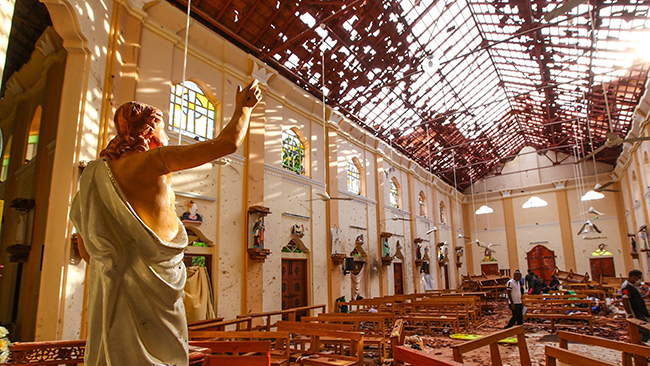
New Delhi (IANS):The arrest of Sri Lanka’s former Intelligence chief, Retired Major-General Suresh Sallay is a turning point in the investigations into the 2019 Easter Sunday bombings that killed 279 people.
The move was a bold one taken by President Anura Kumara Dissanayake who won the presidency in 2024.
He had promised that all persons involved in the attack would be brought to justice.
Sallay was made State Intelligence Service (SIS) chief in 2019 after Gotabaya Rajapaksa became President.
The allegation against Sallay was that he had permitted the attack to take place with the intention of influencing that year’s presidential election, which was eventually won by Rajapaksa.
Sallay had become a prominent figure in Sri Lanka and was widely credited with dismantling the LTTE. His arrest has led to a political storm and many state that it could revive tensions relating to the LTTE.
Ali Sabry, former Sri Lankan Minister for Foreign Affairs said that the developments are deeply troubling.
An Indian official said that the developments in Sri Lanka are being monitored closely.
On the question whether the LTTE issue would come back into the picture following the arrest of Sallay, the officer said that attempts are being made, but it would be very tough.
There have been several cases that the National Investigation Agency (NIA) has been probing concerning the revival of the LTTE.
The ISI, too, has tried its hand in ensuring the revival of the LTTE, but has not been successful so far.
To prevent the revival of the LTTE, both India and Sri Lanka have been working very closely.
Another official explained that the current ties with Sri Lanka have gone from ideological to an investment-led partnership.
Prime Minister Narendra Modi and President Dissanayake share a pragmatic relationship and this has gone a long way in ensuring cooperation on all fields including security, the official explained.
While some in Sri Lanka do not subscribe to Dissanayake’s decision on Sallay, the fact is that the Easter Bombing case has to be probed from every possible angle.
An Intelligence Bureau official says that a major concern today are the activities of the National Thowheeth Jama’ath (NTJ) and Jamathei Millathu Ibrahim (JMI), the two outfits responsible for this attack.
The NTJ in particular has a vast presence in South India and has managed to radicalise a large number of youth in Tamil Nadu and Kerala.
The mastermind of the attack, Mohammad Zahran Hashim was a frequent visitor to Tamil Nadu. He was also responsible for the radicalisation of Jamesha Mubeen who carried out an unsuccessful attempt to bomb a temple in Coimbatore in 2022.
The Indian agencies have been actively pursuing the role played by Hashim. A probe by the NIA in the South India radicalisation case revealed that the entire plot was being run by Hashim from Sri Lanka.
At least 50 of the 100 radicalisation videos seized by the agency were discourses by Hashim, who had close links with the Islamic State.
Officials say that Sallay could provide details to investigators about the module that Hashim ran.
This would come in handy for the Indian agencies who are probing cases directly linked to the NTJ in South India.
Hashim, who was the ring leader for the suicide bombers during the Easter Bombing had spent a considerable amount of time in India.
The Indian agencies would want to learn if any of the locals that Hashim interacted with had any idea about the Easter Bombings.
While in India, Hashim had focussed his radicalisation programmes mainly at Mallapuram, Coimbatore, Nagapattinam, Kanyakumari, Ramnathpuram, Vellore, Trichy and Thirunelveli, the NIA probe found.
Pallay has for now denied any links to the Easter Bombings.
Indian officials say that they do not want to comment on Pallay and his alleged links.However, it is important that the bombings are probed thoroughly since the activities of the NTJ have a direct bearing on India, particularly the southern states, the official also added.
News
Sajith warns: Don’t let trade union action stall cyclone relief
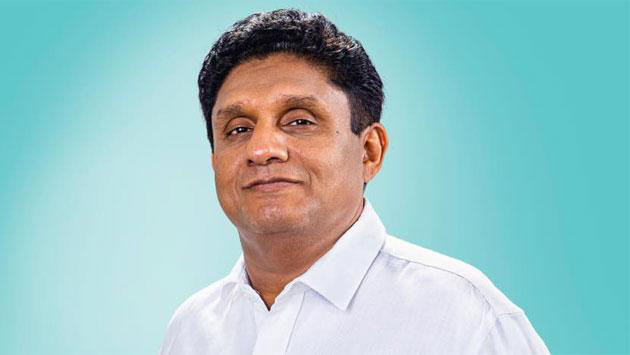
Opposition and SJB Leader Sajith Premadasa on Friday stressed that relief efforts for communities affected by Cyclone Ditwah must not be derailed by internal disputes, as several trade unions announced plans to withdraw from disaster relief duties.
Taking to ‘X’, Premadasa called on the Government to prioritise coordination and ensure uninterrupted assistance to families still awaiting aid.
“The Government must work closely with officers on the ground to ensure coordination and uninterrupted support. When families are still waiting, how can we allow for this confusion?” he questioned, emphasising that relief measures should not be delayed under any circumstances.
His remarks follow the decision by several trade unions representing Government officers engaged in disaster relief operations to launch trade union action beginning from Friday (27 February).
The unions announced their withdrawal from relief-related duties, citing unresolved issues affecting officers involved in post-disaster operations.
According to the unions, more than 93 days have elapsed since the widespread destruction caused by Cyclone Ditwah. During this period, disaster relief officers and Grama Niladharis have worked continuously, day and night, acting as key coordinators between the Government and affected communities. However, they claim that authorities have failed to adequately address longstanding concerns relating to officers engaged in relief work.
Meanwhile, Secretary to the President Nandika Sanath Kumanayake yesterday underscored the need to expedite relief and recovery initiatives.
Chairing a progress review meeting of the National Council for Disaster Management, he called for strengthened coordination among State institutions responsible for disaster response, noting that effective inter-agency collaboration is critical to delivering timely assistance to affected communities.
Efforts to accelerate recovery and maintain continuity in relief operations are ongoing.
News
Complaints filed with CID, Bribery Commission over alleged substandard coal deal
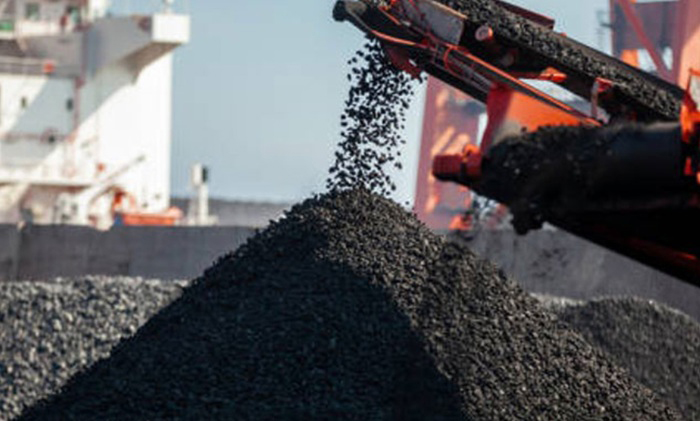
Allegations surrounding the importation of substandard coal intensified yesterday, with civil society representatives and Opposition MPs lodging complaints with the CID and the Commission to Investigate Allegations of Bribery or Corruption, calling for comprehensive investigations into the procurement process and alleged financial losses to the State.
A group of civil organisation representatives submitted a complaint to the CID on Friday (27 February), requesting a probe into what they described as irregularities in the coal procurement process and the resulting loss to the country.
Addressing the media, Ananda Palitha, Convenor of the Samagi Joint Trade Union Alliance affiliated with the SJB, alleged that tender procedures had not been followed properly and claimed that emergency purchases had facilitated corruption.
“The tenders are not called on time. The same company that was previously blacklisted after attempting to bring in substandard rice is now
being awarded the coal tender. They have been given time until July to get registered. The corruption is already confirmed. It is very clear with these emergency purchases,” he charged.
Palitha also expressed confidence that the current President would not interfere with investigations into the coal imports, drawing a comparison to the legal action instituted against former Minister Keheliya Rambukwella over the substandard medicine import controversy during the previous administration.
Meanwhile, a group of SJB parliamentarians filed a separate complaint with the Bribery Commission on Thursday (26 February) over the same issue. MPs Mujibur Rahman, Chaminda Wijesiri, Sujith Sanjaya Perera and Kavinda Jayawardena met Commission officials to formally submit their complaint.
Speaking to the media afterwards, MP Mujibur Rahman alleged that the company concerned had violated two key contractual conditions — by supplying substandard coal and by failing to deliver shipments within the stipulated timeframe.
He contended that either of these violations would be sufficient grounds to cancel the agreement, but claimed the Government was attempting to justify the transaction by asserting that no fraud had occurred.
“By now it has been revealed that this transaction is corrupt,” he said, adding that the Bribery Commission, which had previously conducted extensive investigations into allegations against the former Government, should similarly take action to recover what he claimed was Rs. 7,000 million in public funds lost due to the deal.Investigations into the matter are ongoing.
-

 Features6 days ago
Features6 days agoLOVEABLE BUT LETHAL: When four-legged stars remind us of a silent killer
-

 Business6 days ago
Business6 days agoBathiya & Santhush make a strategic bet on Colombo
-

 Business6 days ago
Business6 days agoSeeing is believing – the silent scale behind SriLankan’s ground operation
-
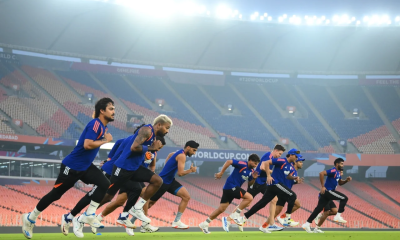
 Latest News7 days ago
Latest News7 days agoIndia, South Africa meet in the final before the final
-

 Features6 days ago
Features6 days agoProtection of Occupants Bill: Good, Bad and Ugly
-
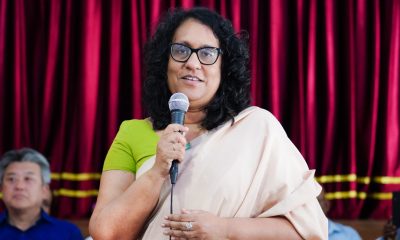
 News6 days ago
News6 days agoPrime Minister Attends the 40th Anniversary of the Sri Lanka Nippon Educational and Cultural Centre
-
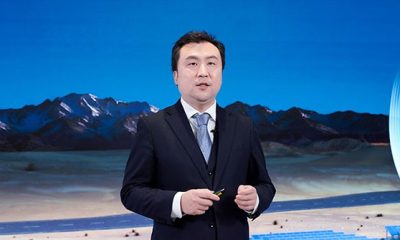
 Business6 days ago
Business6 days agoHuawei unveils Top 10 Smart PV & ESS Trends for 2026
-

 News6 days ago
News6 days agoCoal ash surge at N’cholai power plant raises fresh environmental concerns


